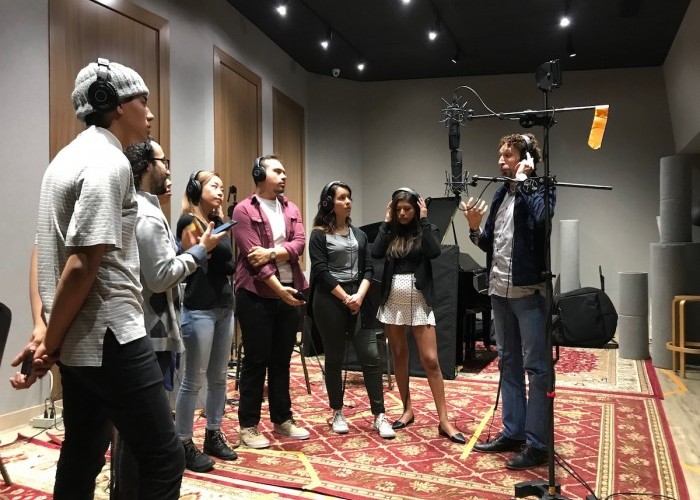Jan 13, 2026 2:09 PM
More Trump-Kennedy Center Cancellations
The fallout from the renaming of the John F. Kennedy Center for the Performing Arts to include President Donald…

John Daversa (right) works with young musicians on the American Dreamers project.
(Photo: Frost School of Music)John Daversa’s American Dreamers: Voices Of Hope, Music Of Freedom (BFM Jazz) is a creation of human concern and swing that springs from the ultimate in musical inspiration. The fact that the album garnered three Grammy wins in February speaks not only to the importance of the plight of Deferred Action for Childhood Arrival residents caught in political limbo, but also to Daversa’s considerable skills as an arranger, bandleader and trumpeter. Yet as brilliant and dynamic as the arrangements might be, they are intended to complement the emotion of the dreamers’ stories.
The hallway to Daversa’s office at the University of Miami Frost School of Music was filled with happy sounds when he interrupted his own trumpet scales exercise to open the door.
The professor and jazz department chair explained how this project found him. Alarmed by President Donald Trump’s move to end the DACA program in November 2017, Daversa and his co-producers decided they had to do something. “The last few years I’ve been evaluating the power of music,” Daversa said. “Whatever I do, I want it to have a clear message, intention, a purpose. I want to put out positive energy into the world, and music is such a potent vehicle.”
When asked about art in service of a sociopolitical statement, he said, “Jazz has always been an agent for social change. When we started discussing the dreamers, we all had those goosebump feelings. The whole purpose was to create a poetic, artful platform to tell the human story. I traveled to 17 states to find out if there were any dreamer musicians who could participate in the project. I’d always find a couple, and then I’d have to go find a studio, so we could record.” In total, the team documented 53 spoken dreamer stories, from 17 different countries.
The final recording includes nine dreamer narratives, each followed by American standards, a Led Zeppelin cover, a James Brown tune and one original. The majority of the big band is staffed by non-dreamers, but some do solo on the recording. In a particularly powerful moment, trombonist Denzel tells his story, including being refused entrance to West Point. With crushing irony, Daversa’s big band follows with a spectacular rendition of “Stars And Stripes Forever.”
In the masterful “Don’t Fence Me In” (a song Japanese American internment camp captives sang over the fence), Daversa’s intense trumpet solo rises in a spirited prayer, calling to and leading his congregation of voices and instruments.
Daversa scored all nine songs in merely six weeks, much of it before classes or while he traveled. “It just had to get done,” he said.
Daversa not only didn’t know the musician soloists beforehand, he didn’t even know which instruments to arrange for. “It was backward. I had to write the music and leave little vignette moments where someone could go in and play, but it wasn’t instrument-specific.”
Reflecting back on the afternoon of the Grammys, Daversa said, “The most nerve-wracking thing for me was if we were to win, I would have to give a speech. I really felt the responsibility of speaking for them in a way that they would be honored.
“It’d be one thing if I could just go up and thank my wife. This was one little moment where perhaps they could feel some support as a group. And then it came up three times,” he said, still seeming a bit stunned. DB

Belá Fleck during an interview with Fredrika Whitfield on CNN.
Jan 13, 2026 2:09 PM
The fallout from the renaming of the John F. Kennedy Center for the Performing Arts to include President Donald…

Peplowski first came to prominence in legacy swing bands, including the final iteration of the Benny Goodman Orchestra, before beginning a solo career in the late 1980s.
Feb 3, 2026 12:10 AM
Ken Peplowski, a clarinetist and tenor saxophonist who straddled the worlds of traditional and modern jazz, died Feb. 2…

The success of Oregon’s first album, 1971’s Music Of Another Present Era, allowed Towner to establish a solo career.
Jan 19, 2026 5:02 PM
Ralph Towner, a guitarist and composer who blended multiple genres, including jazz — and throughout them all remained…

Rico’s Anti-Microbial Instrument Swab
Jan 19, 2026 2:48 PM
With this year’s NAMM Show right around the corner, we can look forward to plenty of new and innovative instruments…

Richie Beirach was particularly renowned for his approach to chromatic harmony, which he used to improvise reharmonizations of originals and standards.
Jan 27, 2026 11:19 AM
Richie Beirach, a pianist and composer who channeled a knowledge of modern classical music into his jazz practice,…